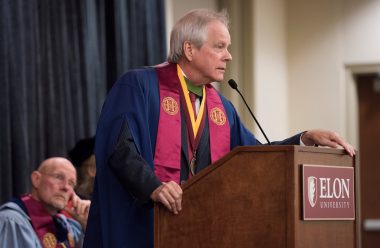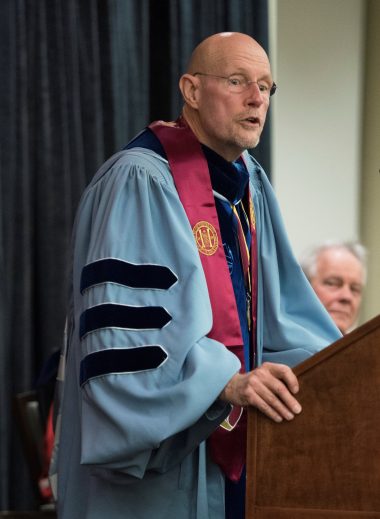Jeffrey C. Pugh, Maude Sharpe Powell Professor of Religious Studies, and David A. Copeland, A.J. Fletcher Professor and professor of communications, were formally awarded the Distinguished University Professorship at a special investiture ceremony on Nov. 13.
Elon University has honored the scholarship, leadership and teaching of longtime faculty members Jeffrey C. Pugh and David A. Copeland by investing them with the Distinguished University Professorship during a formal ceremony on campus.
 Elon University Trustee Kebbler McGhee Williams '98 conferred the professorships on Pugh, the Maude Sharpe Powell Professor of Religious Studies, and Copeland, the A.J. Fletcher Professor and professor of communications, in August. The Distinguished University Professorship is bestowed upon occasion to senior faculty members, honoring their teaching, scholarship, leadership and service to the Elon University community. The board of trustees created the professorship in 2001 and a faculty committee solicits nominations and recommends recipients of the honor to the president.
Elon University Trustee Kebbler McGhee Williams '98 conferred the professorships on Pugh, the Maude Sharpe Powell Professor of Religious Studies, and Copeland, the A.J. Fletcher Professor and professor of communications, in August. The Distinguished University Professorship is bestowed upon occasion to senior faculty members, honoring their teaching, scholarship, leadership and service to the Elon University community. The board of trustees created the professorship in 2001 and a faculty committee solicits nominations and recommends recipients of the honor to the president.
“You are both creative teachers and caring mentors, thoughful and insightful scholars, wise leaders and community members working to bring into being our shared vision for Elon,” said President Leo M. Lambert at the ceremony. “You both exemplify what is best about Elon University.”
The formal ceremony on Nov. 13 offered an opportunity to celebrate their accomplishments inside and outside the classroom, and to give them the chance to reflect on what their time in higher education has meant to them.
In his remarks, Pugh said teaching has truly been a calling, and one that literally saved his life. Pugh said he was driving a truck and suddenly realized that he wanted to pursue a career as a college professor.
“Part of the reason I feel so strongly about this vocation we celebrate tonight is that I have known others who have been saved by education, saved by what we do,” Pugh said. “I have seen my students, our students, have a chance at a better life because of what happens here. I have watched as they found direction, rejoiced when purpose seemed to grow within them from nowhere to propel them out into the world for lives of meaning.”
Pugh, an influential teacher and mentor, joined Elon’s faculty in 1986 after earning his master of divinity degree from Wesley Theological Seminary in Washington, D.C., and a master’s degree and doctorate in theological and religious studies from Drew University Graduate School in Madison, New Jersey. His graduate research focused on systematic and historical theology and he has continued that work during his career at Elon. He received Elon’s Daniels-Danieley Award for Excellence in Teaching in 2000 and the Distinguished Scholar Award in 2010.
Pugh’s ambitious research has resulted in six books, ranging from Nazi-era theologians Karl Barth and Dietrich Bonhoeffer to his work in religion and science.
His most recent book, “The Homebrewed Christianity Guide to the End Times: Theology After You’ve Been Left Behind,” was published by Fortress Press in 2016 as part of a series sponsored by the popular Homebrewed Christianity podcast that takes a unique approach to helping delve into key Christian concepts, figures and ideas. He has also made numerous presentations at professional meetings and conferences, written articles, book chapters and book reviews for various publications, and served eight years as a member of the board of directors of the International Bonhoeffer Society.
As she highlighted Pugh’s career, Pam Kiser, Watts-Thompson Professor in the Department of Human Service Studies and a Distinguished University Professor, said she and Pugh became friends from the moment he stepped on campus, and he quickly became known as a very gifted teacher. “Since 1986, you’ve been the very model of the Elon teacher-scholar, and this was well before the teacher-scholar model existed at Elon,” Kiser said. “Jeff has been a key player in the transformative institution-building that Elon has experienced over the last 30-plus years.”
Drawing lessons from the work “A Handmaid’s Tale” by Margaret Atwood, Pugh said that even as some in society seek to make the mission of higher education “nothing more than job training,” professors can still save the lives of those they teach.
“In the growing specter of lies and deceit that threaten to choke us all to death, the memory of a truth that we belong to each other and the suffering of one of us is the suffering of all of us stands on the borders of self-righteousness and righteous indignation,” Pugh said. “Our work can inspire those in our care to pursue lives of compassion for those who don’t have the opportunity and privilege that those who pass through our gates possess.”
In his remarks, Copeland drew from his experiences in education—as a student, a middle-school teacher and later a university professor—and the lessons he learned along the way in crisis management, service, research and teachable moments. As a teacher, mentor and scholar, Copeland said he’s been inspired by his colleagues and his own mentors, and driven to give back.
“Every bit of information we can uncover, reassess and return to the public sphere for consumption and debate informs, provides a better understanding of some aspect of our existence, and has the potential to affect society,” Copeland said. “It’s really that simple, but it’s hard work.”
Amanda Sturgill, associate professor of communications, praised what Copeland has brought to Elon, saying that during her time at the university in an office next to Copeland, she’s seen firsthand the impact he has had on his students and scholarship. “David does it because he genuinely loves students,” Sturgill said. “A wise speaker I heard once said that in life, it’s more important to have a testimony than a title, and David’s warm relationship with students combined with his inspirational teaching mean he has testimony in spades.”
 A prolific media historian, Copeland has been the series editor for more than 30 books on media history and the interaction of media and society, and has written 12 books. Among his latest works are “The News Media: A Documentary History” and “The Media’s Role in Defining the Nation: The Active Voice.” He was honored in 2010 with the American Journalism Historians Association’s lifetime achievement award, the highest honor the association bestows upon its members. He received Elon’s Distinguished Scholar Award in 2006 and in 2012 he received the university’s Daniels-Danieley Award for Excellence in Teaching.
A prolific media historian, Copeland has been the series editor for more than 30 books on media history and the interaction of media and society, and has written 12 books. Among his latest works are “The News Media: A Documentary History” and “The Media’s Role in Defining the Nation: The Active Voice.” He was honored in 2010 with the American Journalism Historians Association’s lifetime achievement award, the highest honor the association bestows upon its members. He received Elon’s Distinguished Scholar Award in 2006 and in 2012 he received the university’s Daniels-Danieley Award for Excellence in Teaching.
Copeland recounted the role the media has had across history in setting the national conversation, and how technological advances such as the internet have changed how people receive information, and also threatened the ability to have a have conversations based on the same sources of information. The need to track those changes and explore their implications are perfect examples of “why it’s imperative that scholarly activity remains one of the central tenets of the model we have at Elon,” Copeland said.
Copeland has a master’s degree in divinity and a master’s degree in church history from Southeastern Baptist Theological Seminary in Wake Forest, North Carolina, and a doctorate in mass communications research from the University of North Carolina at Chapel Hill. Before coming to Elon, he taught at Emory & Henry College, where the Carnegie Foundation for the Advancement of Teaching named him the Virginia Professor of the Year in 1998. He worked for seven years in North Carolina as a reporter, photographer, sports editor and news editor for daily and weekly newspapers.
Pugh and Copeland become Elon’s fifth and sixth Distinguished University Professors. The four other Distinguished University Professors are Maude Sharpe Powell Professor Emeritus of Philosophy John Sullivan (2002), J. Earl Danieley Professor of Sociology Tom Henricks (2003), Maude Sharpe Powell Professor Emeritus of English Russell Gill (2006) and Kiser (2010).


